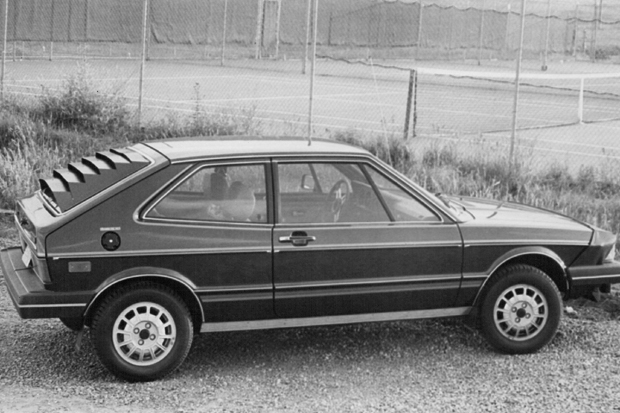Not that I was much of a boy racer, but the sexiest car I ever owned was a 1982 Volkswagen Scirocco with the lines of a paper dart and the cornering of a cheetah. I once drove it overnight from the City to Tuscany with a blind date who barely uttered a word, en route or afterwards. In an era when British factories could make nothing better than a laughable Allegro or a downmarket Escort, everyone coveted a German car — the top choice for twenty-somethings being the VW Golf convertible (Sciroccos were rarer) whose quality came as a revelation after years of broken fanbelts and burst radiators on unreliable Minis.
These were machines that spoke of Teutonic perfectionism and the will to win in global markets that we Brits had lost. Who would have thought that the second of those urges would one day overtake the first in the form of the ‘defeat device’ — secret software that generates false emissions data when the car is laboratory-tested?
But perhaps it’s a mistake to confuse perfectionism with integrity. I have long looked askance at Audi, a marque reinvented by VW under the mantra Vorsprung durch Technik (‘advancement through technology’) that was really no more than futuristic body shapes bolted on to standard VW substructures. The US version of the slogan, ‘Truth in Engineering’, looked lame this week as two million Audis were also revealed to have been fitted with defeat devices.
Hypnotising the consumer by clever image-making is one thing. Designing cars that lie to regulators by revealing only a tiny percentage of their emissions is something else altogether. The defeat device is the equivalent of a pharmaceutical firm adding a secret substance to a new drug to conceal the presence of an ingredient that causes nasty side-effects. There’s no direct equivalent in financial services, since bankers rarely understand the toxicity of their own products in the first place, but it’s a bit like hacking into the Financial Conduct Authority to delete their files on your misdemeanours.
In short, in an era when big-corporate dishonesty seems worryingly endemic, this case is an absolute corker.
Naturally I consult my motor-trade guru, the man in a trilby on the Home Counties forecourt who first sold us our Golfs and Sciroccos back in the 1980s. ‘Rumours about these devices have been around for a while,’ he whispers, adding that wise industry heads have for years been arguing for ‘real world’ rather than laboratory-based testing, which even without cheating can create false expectations.
He cites the BMW i8 sports hybrid, which is officially capable of 139 miles per gallon (when its electric motors are used to the full) but clocks about 40 mpg in normal road conditions. That’s still amazingly good for a car that goes like a rocket, he says; likewise, the VW scandal is clouding the fact that the past 15 years have seen huge real-world improvements in emissions per vehicle-mile through cleaner fuels and lower consumption in more efficient engines.
Meanwhile, reputational consultants are queuing to offer their advice to the Volkswagen board, who have seen €30 billion wiped off the value of their company. As a flagship of the German economy and a model of the way it harnesses state and private interests — and a maker of cars that millions of drivers still desire — VW under new executive leadership must and eventually will recover, while other car-makers will probably be found guilty of similar deceits. But the moral of the story is a universal one for all businesses. Do what you say, meaning only sell products that live up to their claims; and say what you do, meaning always be honest about the risks your products carry.
Go private, Ivan
The only company taking an even bigger market battering than Volkswagen this week was Glencore, the Swiss-based commodity trading and mining giant at which I have also from time to time looked askance, and which has seen its shares fall by three quarters since May. Some analysts say a continuation of the slump in demand for copper and other metals could leave debt-laden Glencore with no equity value at all. Others think the stock is now heavily oversold, in part thanks to short-sellers using it as a way to make money out of worries about the Chinese downturn.
One way to reassure investors that the group has enough cash to keep going would be to sell off all or part of its agricultural business, said to be worth $10 billion-plus. Certainly no good would be served by Glencore’s collapse, and my own kindly advice to chief executive Ivan Glasenberg would be to take the company private again: it has never felt quite right as a public company, and its shares seem fated to be the playthings of ruthless traders just like itself.
After Carney
John McDonnell — unconvincingly disguised as a bank manager for his party conference appearances — says he will ‘review the mandate’ of the Bank of England to make it more focused on ‘prosperity in the economy’ and ‘long-term investment in infrastructure’. Behind this, I sense, is not the shadow chancellor’s dismay at the Bank’s record of missing its inflation target (monetary instability makes fertile ground for revolution, after all) but his urge to fire a shot across the bows of governor Mark Carney, who has said plainly that he cannot ‘envision any circumstance’ in which a sensible central bank like his would finance government deficits in the way Corbynistas would wish, via ‘people’s QE’ or otherwise.
Carney was originally expected to serve only five years at the Bank, until 2018, and McDonnell is clearly warning him not to bother offering to extend. But who would the incoming red chancellor appoint in Carney’s place? One of his new team of advisers, such as Thomas Piketty, advocate of global wealth taxes, or former MPC resident wacko David Blanchflower? Russell Brand? Here’s a dinner-party game to keep us amused ahead of the next election.







Comments